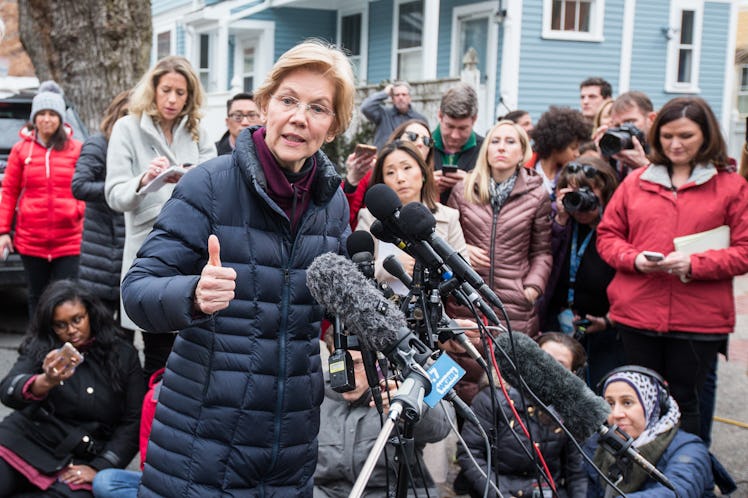
2020 Presidential Candidates Are Already On The Horizon, So Get Ready
If it feels like elections are starting to become like Black Friday shopping, creeping ever earlier into the year, it's not just you: The 2018 midterm elections hadn't even shaken out and people were already projecting who might run for president in 2020. With the new year marking the start of the next election cycle's fundraising, some candidates are already weighing their intentions to challenge President Donald Trump next November. So when do presidential candidates announce they're running? Apparently, now is the time.
On Monday, Dec. 31, Sen. Elizabeth Warren of Massachusetts announced she'd be launching a committee that may signal a forthcoming 2020 presidential bid from the high-profile Democrat. At the same time, other big-name Democrats put to bed questions about whether they'd consider running. "I will not be running for President in 2020, but I hope Beto O'Rourke does," tweeted Maryland Gov. Martin O'Malley on Thursday, Jan. 3. "It's time for a new generation of leadership."
Also on Thursday Jan. 3, the 116th Congress was officially sworn in. The day marked a larger political moment, as the most diverse U.S. House of Representatives ushered in what many hoped was the start of a new era in Washington. With the "Blue Wave" momentum and wild success of "new kids on the block" candidates in 2018, the Democrats, for one, may see an opportunity (or a need) to appeal to a different set of voters this time around.
And though it might seem like there's no break in the political circus for elections, that's pretty standard. The 2020 candidates are right on time, a New York Times comparison shows; recent presidential elections have begun to see candidates emerge around this same time, with some even announcing their intentions to run more than two years in advance of Election Day. That's... a long race.
Though the Iowa caucuses and the subsequent primary elections aren't until 2020, there's plenty of campaigning events happening in the meantime. As Business Insider notes, the official fundraising calendar for the 2020 election cycle opened on Tuesday, Jan. 1, and with the close of that quarter at the end of March, political hopefuls will get a glimpse into where their standing is out of the gate. The first Democratic debates of the cycle will also begin in just a few months, coming up in the summer of 2019.
And as the Times points out, while early 2020 candidates aren't on any ballots yet, they're doing a lot of the mandatory legwork now. That includes getting a base of funding out of the gate and building grassroots support so that they can differentiate themselves in what looks to be a crowded field of candidates. Like Warren, candidates may choose to pursue an exploratory committee meant to help test the waters and do the political equivalent of market research before launching on the big stage — as well as staff up and fundraise.
There's already quite a large cast of characters who may pose a Democratic challenge to Trump, although many of the names that have been floated have yet to announce a formal interest in pursuing the office. Certainly, name-dropping has been going on for some time, well before the 2018 midterms, with Democratic figures like former senatorial candidate Beto O'Rourke of Texas, Senator Kamala Harris of California, and former Vice President Joe Biden among the mentions. And plenty of people have already pinned their hopes and predictions on potential candidates well before the field has shaped up.
On the Republican side, there are just as many wildcards. It's unclear at this point who the eventual challengers to Trump might be (if there are any), but the other question is whether the incumbent president will still in fact be Trump: should Trump be removed from office, resign, or for any other reason not still be president when the 2020 primaries come to pass, Vice President Mike Pence would presumably be the man to beat. Given all the discussions around impeachment, it's not all that far-fetched, although as of January 2019 no formal impeachment proceedings have been started.
It's worth noting too that some states are handling their primaries differently this time around rather than the way they did in 2016, Politico notes. While several states in 2016 used a caucus system, in which voters of a party decide their candidate at a forum (potentially giving a bump to candidates with a fired-up and politically active base) ahead of the general election, some of those same states will be using a traditional vote-based primary in 2020.
However it shakes out, there's both plenty of time and not much time at all until the race really begins to take shape. Keep an eye on what happens over the next few months, but take everything with a grain of salt: If recent politics is any guide, timing is everything, and things could change quickly. In the meantime, Happy Swearing-In Day!